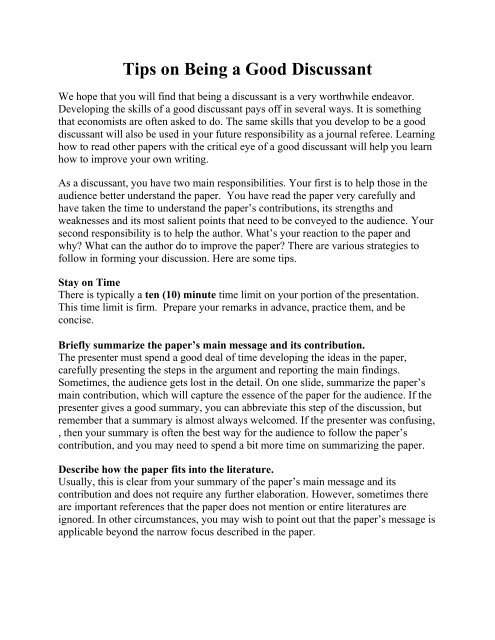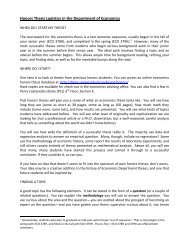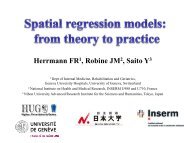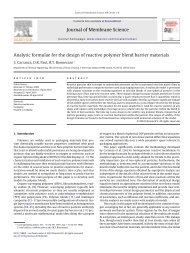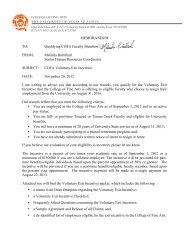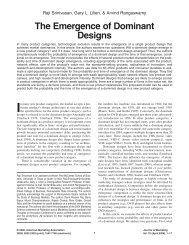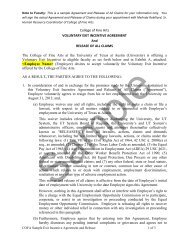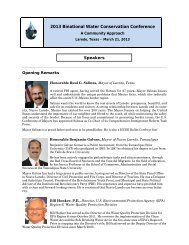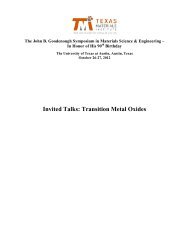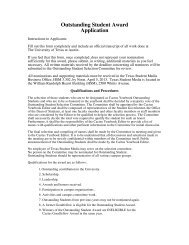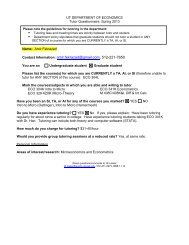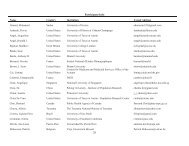Tips on Being a Good Discussant
Tips on Being a Good Discussant
Tips on Being a Good Discussant
- No tags were found...
You also want an ePaper? Increase the reach of your titles
YUMPU automatically turns print PDFs into web optimized ePapers that Google loves.
<str<strong>on</strong>g>Tips</str<strong>on</strong>g> <strong>on</strong> <strong>Being</strong> a <strong>Good</strong> <strong>Discussant</strong><br />
We hope that you will find that being a discussant is a very worthwhile endeavor.<br />
Developing the skills of a good discussant pays off in several ways. It is something<br />
that ec<strong>on</strong>omists are often asked to do. The same skills that you develop to be a good<br />
discussant will also be used in your future resp<strong>on</strong>sibility as a journal referee. Learning<br />
how to read other papers with the critical eye of a good discussant will help you learn<br />
how to improve your own writing.<br />
As a discussant, you have two main resp<strong>on</strong>sibilities. Your first is to help those in the<br />
audience better understand the paper. You have read the paper very carefully and<br />
have taken the time to understand the paper’s c<strong>on</strong>tributi<strong>on</strong>s, its strengths and<br />
weaknesses and its most salient points that need to be c<strong>on</strong>veyed to the audience. Your<br />
sec<strong>on</strong>d resp<strong>on</strong>sibility is to help the author. What’s your reacti<strong>on</strong> to the paper and<br />
why What can the author do to improve the paper There are various strategies to<br />
follow in forming your discussi<strong>on</strong>. Here are some tips.<br />
Stay <strong>on</strong> Time<br />
There is typically a ten (10) minute time limit <strong>on</strong> your porti<strong>on</strong> of the presentati<strong>on</strong>.<br />
This time limit is firm. Prepare your remarks in advance, practice them, and be<br />
c<strong>on</strong>cise.<br />
Briefly summarize the paper’s main message and its c<strong>on</strong>tributi<strong>on</strong>.<br />
The presenter must spend a good deal of time developing the ideas in the paper,<br />
carefully presenting the steps in the argument and reporting the main findings.<br />
Sometimes, the audience gets lost in the detail. On <strong>on</strong>e slide, summarize the paper’s<br />
main c<strong>on</strong>tributi<strong>on</strong>, which will capture the essence of the paper for the audience. If the<br />
presenter gives a good summary, you can abbreviate this step of the discussi<strong>on</strong>, but<br />
remember that a summary is almost always welcomed. If the presenter was c<strong>on</strong>fusing,<br />
, then your summary is often the best way for the audience to follow the paper’s<br />
c<strong>on</strong>tributi<strong>on</strong>, and you may need to spend a bit more time <strong>on</strong> summarizing the paper.<br />
Describe how the paper fits into the literature.<br />
Usually, this is clear from your summary of the paper’s main message and its<br />
c<strong>on</strong>tributi<strong>on</strong> and does not require any further elaborati<strong>on</strong>. However, sometimes there<br />
are important references that the paper does not menti<strong>on</strong> or entire literatures are<br />
ignored. In other circumstances, you may wish to point out that the paper’s message is<br />
applicable bey<strong>on</strong>d the narrow focus described in the paper.
Evaluate if the paper makes its case.<br />
Almost every paper in its introducti<strong>on</strong> claims its c<strong>on</strong>tributi<strong>on</strong>. Are the claims<br />
c<strong>on</strong>vincing Are there problems with specific parts of the argument For example, “It<br />
succeeds in making points 1–5 but not 6–8.” If problems exist, identify them. Is it a<br />
mistake in ec<strong>on</strong>omics, mathematics, data analysis or interpretati<strong>on</strong><br />
Describe any unique aspects of the paper.<br />
Is there a particularly useful and interesting approach in the paper If the paper<br />
introduces you to a new technique or interesting data set and you think that it will be<br />
useful in other applicati<strong>on</strong>s, then share it with the audience.<br />
Simplify the paper’s technical c<strong>on</strong>tributi<strong>on</strong> if unduly difficult to understand.<br />
Sometimes a paper’s results are hard to understand. There’s a lot of technical detail<br />
that obscures the intuiti<strong>on</strong> behind a result. Something may seem counterintuitive at<br />
first, but not, if you look at it in a different way. You may be able to make the main<br />
points in a way that highlights clearly what’s going <strong>on</strong> in the paper. This is very hard<br />
to pull off but can be a great help to the audience. It’s good training for you to think<br />
about just what you need and d<strong>on</strong>’t need to c<strong>on</strong>vey the paper’s findings.<br />
Make suggesti<strong>on</strong>s <strong>on</strong> how to improve the paper.<br />
Do you think the paper could be strengthened by changing it in some directi<strong>on</strong> Are<br />
there obvious directi<strong>on</strong>s for future research Try to be specific. It’s not helpful to<br />
make very general and vague recommendati<strong>on</strong>s, so d<strong>on</strong>’t.<br />
Focus <strong>on</strong> the big picture.<br />
Do not get bogged down in details. A typical discussi<strong>on</strong> lasts 10 minutes, which<br />
allows you time for four to five overheads. Decide what needs to be said and focus <strong>on</strong><br />
making your points to the audience and author <strong>on</strong> those slides. Try to distill your<br />
discussi<strong>on</strong> to <strong>on</strong>e or two important points and use most of your time in discussing<br />
them. After the seminar is usually the best time to go over the many small but useful<br />
comments and correcti<strong>on</strong>s, including spelling errors, incorrect citati<strong>on</strong>s, etc. D<strong>on</strong>’t<br />
waste your discussi<strong>on</strong> time going over minutiae unless the paper includes no<br />
substantive points and is poorly written.<br />
Be c<strong>on</strong>structive.<br />
Authors need feedback <strong>on</strong> their work. Was something missed Is something obviously<br />
wr<strong>on</strong>g Is the work interesting And, most importantly, how can the paper be<br />
improved Again, many small suggesti<strong>on</strong>s are best handled in a private c<strong>on</strong>versati<strong>on</strong><br />
between you and the author after the seminar, but if <strong>on</strong>e or two are particularly clever,<br />
then you can share them with the audience. Above all, try to avoid making unhelpful<br />
criticism. Substantiate your criticism.
D<strong>on</strong>’t apologize for being a poor choice to discuss the paper.<br />
Over time, we all get asked to discuss papers that are not in our immediate area of<br />
expertise. Just do the best you can without apologizing. If the paper was delivered to<br />
you very late, or if the paper presented has underg<strong>on</strong>e major changes from the draft<br />
the author sent you, then the presenter should apologize to you and the audience and<br />
should let every<strong>on</strong>e know that you were not given the tools to properly do your job. If<br />
the presenter does not offer you this courtesy, then you may explain. For example, “I<br />
haven’t seen this draft of the paper, so some of my comments may no l<strong>on</strong>ger be<br />
relevant.”<br />
Getting Down to Business<br />
In preparati<strong>on</strong> of your discussant role, you may find helpful the following<br />
suggesti<strong>on</strong>s:<br />
Make a list initially of all of the paper’s secti<strong>on</strong>s, tables, figures, etc., and the<br />
approximate number of pages devoted to each.<br />
Read the paper <strong>on</strong>ce just to form an initial impressi<strong>on</strong> of what each secti<strong>on</strong> does<br />
and how they fit together.<br />
Make a list of things that you particularly notice or questi<strong>on</strong>s you have.<br />
Read the paper again making a new list in resp<strong>on</strong>se to your first list. (Some<br />
questi<strong>on</strong>s may go away up<strong>on</strong> the sec<strong>on</strong>d reading.)<br />
Work through each equati<strong>on</strong> and table, making sure that you can either<br />
reproduce the math or verify the calculati<strong>on</strong>s and, most importantly, you<br />
understand the result.<br />
Jot down anything else that seems unusual, interesting, or an idea for a<br />
potential extensi<strong>on</strong>.<br />
Read a few of the background papers from the references to get a better idea of<br />
how the paper fits into the literature.<br />
Review all your notes and develop a discussi<strong>on</strong> outline.<br />
Set the paper aside if time permits.<br />
Prepare your remarks after reading the paper <strong>on</strong>ce again. Make sure you have<br />
c<strong>on</strong>cisely summarized the paper and your remarks are relevant and helpful. If<br />
you are not sure, read the paper and citati<strong>on</strong>s again until you are c<strong>on</strong>fident.<br />
Prepare your slides with <strong>on</strong>ly the most important details/equati<strong>on</strong>s/results/etc.<br />
Be happy with a preparati<strong>on</strong> well d<strong>on</strong>e.
During the Presentati<strong>on</strong><br />
Pay careful attenti<strong>on</strong> to the paper’s presenter and try to adjust your comments to<br />
create a natural flow from presentati<strong>on</strong> to discussi<strong>on</strong>. This will require modificati<strong>on</strong><br />
<strong>on</strong> your part. Do what you feel comfortable with. For example if the presenter makes<br />
a point particularly well, you will probably not want to spend much time <strong>on</strong> it. On the<br />
other hand, if an important idea was not well presented and you feel c<strong>on</strong>fident in<br />
addressing it, by all means do so.


